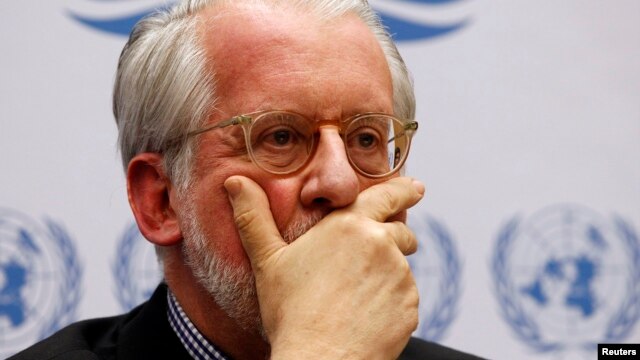
Paulo Pinheiro, chairperson of the International Commission of Inquiry on Syria for the United Nations Human Rights Council listens during a news conference on the presentation of their latest report at the U.N. In Geneva, June 3, 2013.
A new United Nations report says there are "reasonable grounds" to believe a limited amount of chemical weapons have been used in Syria, while pro-government and opposition fighters continue to commit human rights violations.
Paulo Pinheiro, chairman of the U.N. Commission of Inquiry on Syria, stressed the human toll of the two-year conflict as he presented the report to the U.N. Human Rights Council.
"Crimes that shock the conscience have become a daily reality," he said. "Humanity has been the casualty of this war. Syria needs not a military surge, Syria needs a diplomatic surge. We cannot continue to sit idly by and watch this catastrophe unfold."
The commission's report says there is not enough evidence to determine which chemical agents have been used in Syria, or who deployed them. It says those conclusions would require testing victims and collecting samples at the site of four alleged attacks.
The report urges Syria to allow a team of U.N. investigators into the country to investigate chemical weapons use. The Syrian government has said investigators would only be able to visit one site.
Both the government and rebels trying to oust President Bashar al-Assad have accused the other side of using chemical weapons.
The commission also cautioned Tuesday that adding weapons to the conflict would raise the risk of human rights violations. Pinheiro says evidence from the past two years shows an escalation in fighting that has had "devastating consequences for civilians."
"A military stalemate has prevailed," he said. "It is a great illusion that more weapons will tip the balance between the two parties. No one is winning, and will not win, this war. More weapons will only lead to more civilians dead and wounded."
He said the "conflict is becoming more horrific every day."
The warning comes a week after the European Union amended its arms embargo on Syria, clearing the way for future shipments of weapons to rebel fighters.
The commission's report says both sides have committed rights abuses, but as in earlier reports by the commission, it says rebel violations did not reach the intensity and scale of those by pro-government forces.
Russia and the EU are holding a second day of talks Tuesday overshadowed by disputes over the EU's backing of the Syrian opposition and Moscow's continued support for Assad.
The summit is taking place as Russia and the United States continue to try to arrange an international peace conference that would bring together both the Syrian government and the opposition pushing to oust the Syrian leader.
Russian Deputy Foreign Minister Sergei Ryabkov said Monday that the United States is not putting enough pressure on the Syrian opposition to participate in the international talks and drop its demand for President Assad's exit.
The Syrian government has said it is willing to attend such a conference in principle. But the main opposition coalition has rejected the idea, saying talks are meaningless while Syrian troops backed by Hezbollah and Iranian personnel commit alleged atrocities against the Syrian people.
Russia has opposed any kind of foreign involvement, and has used its veto power on the United Nations Security Council to block three proposed resolutions against the Syrian government.
The United States is sending Patriot missiles and F-16 fighter jet aircraft to Jordan as part of a planned military exercise, with an agreement that some of the equipment may stay in the country to bolster security against violence from Syria.
A spokesman at the U.S. Central Command told VOA that the deployment will send the weapons for a multinational training exercise called Eager Lion later this month.
Concern has been growing that Syrian missiles being shipped to Lebanon's Hezbollah militia could be used to attack targets across the region. |
|
